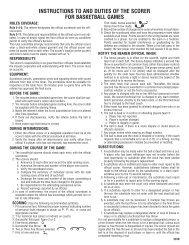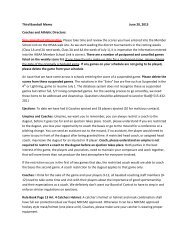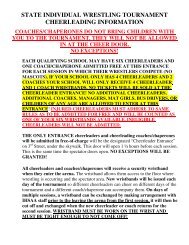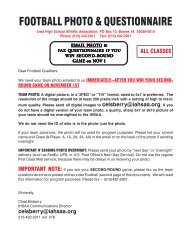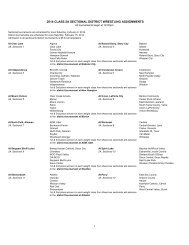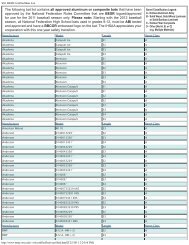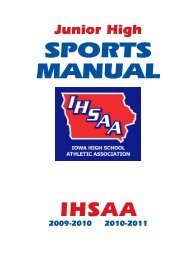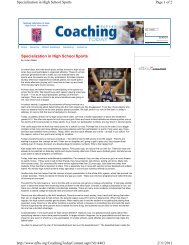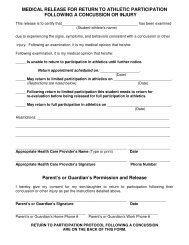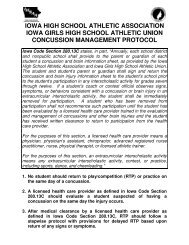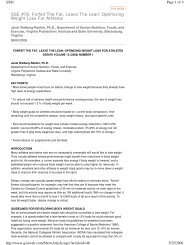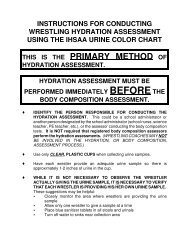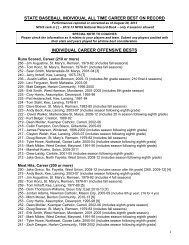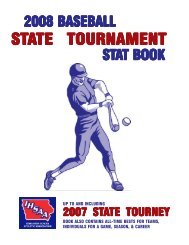2009-2010 Basketball Highlights - Iowa High School Athletic ...
2009-2010 Basketball Highlights - Iowa High School Athletic ...
2009-2010 Basketball Highlights - Iowa High School Athletic ...
You also want an ePaper? Increase the reach of your titles
YUMPU automatically turns print PDFs into web optimized ePapers that Google loves.
<strong>2010</strong>-2011 BASKETBALL HIGHLIGHTS<br />
OFFICIALS: DATES TO REMEMBER <strong>2010</strong>-2011<br />
1. Each official wanting to be considered for a 2011 basketball tournament assignment must submit a Request Form on-line to<br />
the IHSAA Office by 4:00 p.m., December 6, <strong>2010</strong>. Your request should include your partner’s name and a copy of your<br />
<strong>2010</strong>-11 officiating schedule.<br />
The 2011 basketball tournament dates are February 14, 17, 21, 22, 24, 25, 26, 28, March 1, and March 7-12 (state<br />
tourney). If you have conflicts on any of these dates, please indicate any conflicts on the website form.<br />
Remember, you must have attended or viewed the on-line <strong>2010</strong> IHSAA-sponsored rules meetings and must have submitted<br />
your <strong>2009</strong>-<strong>2010</strong> basketball sportsmanship rating form on line, on time, in order to be tournament eligible for the 2011 boys<br />
basketball tournaments.<br />
2. Supervised (Part II) exams are scheduled for Monday, November 29, <strong>2010</strong> and Wednesday, December 1, <strong>2010</strong>. The sites of<br />
these exams are found in the <strong>2010</strong>-11 IHSAA Officials Guide or on the IHSAA web site (www.iahsaa.org). The exam begins<br />
at 7 PM. Passing the exam on one of the two nights (only allowed to take the exam on one night) will allow you to improve<br />
your classification. If this is your fourth year as a temporary official, you must make plans to take and pass the<br />
supervised exam if you want to maintain your officiating license after this year.<br />
OFFICIALS CLINIC REQUIREMENT (starting with the 2008-09 season). New football, basketball and baseball officials are<br />
required to attend an IHSAA-sponsored clinic within three years of their initial registration. Wrestling officials only, this<br />
requirement started with the <strong>2009</strong>-<strong>2010</strong> registration period. Also, any official wanting to be considered for tournaments<br />
is required to attend a clinic within a three year period STARTING with the 2008-09 season. (Exception; Wrestling<br />
starts with the <strong>2009</strong>-10 season) No fee will be charged for attending these clinics. Circle T officials (who are registered for<br />
lower level contests only) and officials not interested in working tournaments are not required to attend a clinic but<br />
recommended. A rules meeting will be offered as part of the clinics, however, individuals must attend both clinic AND<br />
rules meeting to receive credit. Officials and coaches can not just attend the rules meeting portion of the clinic for rules<br />
meeting approval. IHSAA/IGHSAU state “Sponsored” clinics would be the only clinics in which IHSAA rules meetings would<br />
be provided.<br />
TEMPORARY OFFICIALS, you must take the Part I exam before you will be issued an officiating license or can officiate any<br />
games.<br />
• YOUR FINAL VARSITY ONLY BASKETBALL SPORTSMANSHIP RATINGS SHOULD<br />
BE DONE ON-LINE BY MARCH 14, 2011, NO LATER THAN 4:00 P.M. PRINT YOUR<br />
RATINGS FOR YOUR RECORDS.<br />
LICENSED OFFICIALS<br />
1. In games involving grades 9-12, all officials must be registered with the IHSAA.<br />
2. In 7th and 8th grade games, at least one of the game officials must be registered with the IHSAA.<br />
3. Failure to use licensed officials according to #1 and #2 above will result in forfeiture of contest by the school responsible for<br />
hiring the officials.<br />
IHSAA POLICY WHEN GAME OFFICIALS DON’T SHOW UP<br />
1. Contact other licensed officials.<br />
2. Play the game with one licensed official.<br />
3. Reschedule the game.<br />
DUTIES OF GAME MANAGEMENT<br />
RELATIONSHIP OF GAME MANAGEMENT TO OFFICIALS<br />
1. General: Most officials continue in the work because it is an avocation which provides the opportunity to maintain contact with<br />
the game and with those who administer the contests. If responsible and highly respected people are to be kept in the field,<br />
they should be granted the cordial and businesslike treatment they expect in professions and in other vocations. They are<br />
requested to render decisions in rather technical matters and in an atmosphere charged with prejudice and emotion. No<br />
effort should be spared in providing conditions which will be conducive to efficiency and pleasant associations. Each contest<br />
administrator owes this to the official who is a guest and to the school which must depend on the work being of such a<br />
nature as to attract men and women who are in the habit of being treated with respect.<br />
2. Here are a few reminders:<br />
a. Notify the officials at least one week before each game giving the exact time and place of the game and the location of<br />
the official’s dressing room.<br />
b. Inform each official who they will be working with. Perhaps a ride can be shared.<br />
c. If parking facilities are a problem, provide a place for the officials.<br />
1
d. Designate a capable student manager to act as host to the officials. The host should meet them at the door, escort them<br />
to the dressing room(s) and see that they are provided with towels and soap. The host may also accompany the officials<br />
to the floor and will take care of their jackets and be responsible for the game ball between halves. The host<br />
management should provide personnel to wipe the floor and maintain proper floor conditions as requested by the<br />
officials.<br />
e. The official’s check should be handed to the official privately before the game, or mailed if payment is not able to be<br />
made at the game site.<br />
f. Provide a clean, private dressing room with shower, or nearby shower stall. Before and after a game, and at halftime, the<br />
official’s room(s) should be “out-of-bounds” for everyone except the few who have a definite assignment there.<br />
g. Insist that coaches instruct their players to be courteous and respectful to all officials. Players should be instructed to<br />
address officials as “Mr., Ms. or Mrs. Referee” or “Mr., Ms., or Mrs. Weaver,” not as “Ref,” or “Susan or Noel.” A time-out<br />
should be requested if rules questions are to be directed to the officials and the privilege of asking the rules question(s)<br />
should be delegated to the captain only. Questions should be limited to those dealing with rules interpretation or game<br />
procedure. Nothing is ever gained by questioning an official’s judgment and it may lead to a penalty. A public expression<br />
of dissent from an official’s judgment decision merely excites the fans and often results in a penalty. Reference Conduct<br />
Counts materials sent to your local school district.<br />
h. Keep your crowd under control. A continuing program of education and training will work wonders. Police protection<br />
should be available and in evidence.<br />
i. Insist that coaches set good examples for your crowd and players. Remain seated on the bench. Do not shout at players<br />
or officials. The coach, more than any other person, sets the pattern for the attitude of the fans.<br />
j. Do not permit coaches to argue or visit with the official during a game or during an intermission. Criticizing an official in<br />
front of fans or players invites trouble. Avoid the officials’ dressing room(s). If you have a grievance, stay away. See<br />
him/her or them later. That will be soon enough. Better yet, write a letter after three or more days.<br />
k. You either hired or approved the officials. Take your share of the blame if you are not pleased. The chances are about<br />
100 to 1 that your team lost the game because of the officiating.<br />
I. Emotions need to be controlled. Modern basketball calls for coaches and players who have poise and coolness under<br />
stress. Team directors must demonstrate the same qualities.<br />
3. Gymnasium conditions have a great influence in administration of a game. A slippery floor or one with a layer of accumulated<br />
dust is a source of trouble and dissatisfaction. An inadequately lighted court detracts from efficiency and has a depressing<br />
effect on everyone. Unclean backboards, basket rings which are not level or basket nets which are either ragged or tight so<br />
as to cause delays are conditions which contribute to an unsatisfactory event. For many school patrons, the athletic contest<br />
provides the only opportunity for seeing the school in action. Their impression ought to be one of good organization and<br />
businesslike efficiency.<br />
4. Starting a game later than scheduled and having unduly long athletic contests are evidence of faulty administration. They are<br />
an imposition on the visiting team, the students, the fans, and the officials.<br />
5. Properly administering a contest is an exacting task. Many co-workers are involved. Each member of this team of student<br />
managers and faculty assistants has delegated responsibilities. It is important to conduct practice for this team in the<br />
fundamentals of good management. The school which is fortunate enough to have such a team with pride in its work, will<br />
have a minimum of “athletic headaches” because they provide conditions which keep players and followers in a frame of<br />
mind to look for enjoyable occurrences and to be tolerant in passing judgment on decisions and playing strategy.<br />
SELECTION OF SCORERS AND TIMERS<br />
1. Choose adults. A high school student or one of last year’s graduates will have the interest and enthusiasm but may lack<br />
poise, impartiality and judgment.<br />
2. Choose someone who has had some playing, coaching, or officiating experience.<br />
3. Choose men or women who can and will be present at every home game. It may be an honor to act as timer or scorer, but<br />
it’s not an honor which should be passed around with each game.<br />
4. If faculty men or women are available for these jobs, they usually do the best work, although it is not a guarantee.<br />
5. Above all, choose someone with plenty of poise, good judgment, a sense of impartiality and one who you are sure will be<br />
able to forget the score and concentrate instead on the job.<br />
6. IT IS STRONGLY RECOMMENDED THE OFFICIAL SCORER WEAR BLACK-AND-WHITE STRIPED OFFICIAL’S SHIRT<br />
WHILE PERFORMING HIS/HER DUTIES DURING THE CONTEST.<br />
TRAINING THE TABLE OFFICIALS<br />
1. Before the opening of the season, provide the table officials with a Rules Book, and other basketball rules material available<br />
through the State Office. This should be done regardless of the number of years they may have served in this capacity.<br />
There are frequent rules changes which affect the tasks of these officials. It might be well to mark or otherwise call attention<br />
to those sections of the rules which directly or indirectly refer to their duties. Insist on a careful study of the “Instructions to<br />
Scorers” and “Instructions to Timers.”<br />
2. Insist that your timer and scorer attend or view one of the state-sponsored rules interpretation meetings; and, if possible, an<br />
occasional meeting of a local officials’ group.<br />
3. Before the first game, arrange for several intersquad scrimmages conducted under actual game conditions with your timer<br />
and scorer at the bench. Plan to set up unusual situations involving timing and scoring and check carefully on the work done<br />
in these scrimmages and make comments and criticisms.<br />
4. Observe the work of these officials during games and make suggestions for improvement.<br />
2
5. See that your timers and scorers are granted the same courtesy and respect as that due of the floor officials. Their work is<br />
important and it should be done with dignity and pride in good performance.<br />
RECOMMENDED THE OFFICIAL SCORER WEAR A BLACK-AND-WHITE STRIPED<br />
GARMENT AND HIS/HER LOCATION BE CLEARLY MARKED<br />
The Officials Advisory Committee recommended and the Board of Control adopted the recommendation that only the official<br />
scorer wear a black-and-white striped garment and the official scorer’s location be clearly marked. An “X” 12 inches long and<br />
2 inches wide shall be placed on the floor, out of bounds, and directly in front of the scorer for ease in identifying the<br />
scorer. The timer and scorer should be seated next to each other.<br />
IHSAA BENCH CONDUCT RULE<br />
A coach will be allowed to stand and confer with a player(s) whenever the clock is not running. Communication with the<br />
player(s) only, should be done in a positive manner and shall take place directly in front of where the coach was seated.<br />
When a coach finishes conferring with the player(s) or the ball is put in play (clock will start) the coach shall return immediately<br />
to the bench. Coaches are not to stand and show displeasure regarding any situation they are not happy with. This<br />
unsportsmanlike behavior is subject to a technical foul being called. The officials will not delay a throw-in administration to<br />
permit a coach additional dead clock time to visit with a player(s). This change will allow coaches additional opportunities to<br />
stand up and instruct players while the clock is not running during the game. Coaches are not to visit/ask questions with<br />
officials, even though the clock is not running, unless they are seated. Standing when the clock is not running is a<br />
coaching opportunity only.<br />
DISQUALIFIED PLAYER: A coach will now be permitted to stand up following notification of a disqualified player and walk the<br />
confines of his/her bench to select a replacement for the disqualified player. The rule states a player must be replaced within<br />
20 seconds from the time the coach is notified. Any unsporting acts on the coaches part are subject to being assessed a<br />
technical foul.<br />
Coaches, these are two additional opportunities to stand up and coach. The IHSAA/IGHSAU asks that you respect these<br />
opportunities and use these positive teachable moments for the right reasons.<br />
BENCH DECORUM: Besides the two above mentioned, coaches may stand or leave the bench for:<br />
1. Charged time-out, confer with players<br />
2. In case of injury, if beckoned by official, attend an injured player(s)<br />
3. Intermission<br />
4. Prevention or notification of a correctable error 2-10<br />
5. Stand up to show approval of an exciting play<br />
6. Stand up to call time-out when his/her team is in possession of the ball<br />
7. Stand to congratulate a player being substituted for<br />
8. Confer with personnel at the scorer’s regarding a timing error, scoring error, or alternating possession error<br />
7TH & 8TH GRADE BASKETBALL<br />
1. At least one of the game officials must be registered with the IHSAA.<br />
2. The intermediate size basketball shall be used for all 7th and 8th grade competition. It is the same basketball currently used<br />
for girl’s basketball in <strong>Iowa</strong>.<br />
3. The 3-point goal will not be used in junior high basketball games played in <strong>Iowa</strong> (grades 7 & 8).<br />
VIDEOTAPING/FILMING FOR SCOUTING PURPOSES<br />
Videotaping or filming is permissible in scouting your opponent. Your opponent shall be notified, space for taping or filming<br />
for scouting is not required of the host school. Hand-held cameras are recommended. If you are going to videotape or film your<br />
opponent for scouting purposes, please call ahead and notify them that someone from your school will be taping the game<br />
while scouting.<br />
<strong>2010</strong> IHSAA BOYS BASKETBALL TOURNAMENT BASKETBALL<br />
The basketball the IHSAA will be using in IHSAA 2011 tournaments will be the Spalding ZK Pro, wide-channeled ball. This<br />
ball will be used in ALL tournament games.<br />
NFHS MECHANICS<br />
Communication and consistency remain the most important elements of good officiating. It is important for officials to be<br />
familiar and comfortable with the proper NFHS officiating mechanics. The primary reasons for utilizing only approved NFHS<br />
mechanics are:<br />
3
1. Effective communication between officiating partner(s)<br />
2. Providing immediate information and feedback to coaches, players, scorers, timers, and knowledgeable fans<br />
3. Foul calling - with a signal to stop the clock and appropriate eye contact with partner(s) the “double foul<br />
dilemma” can be avoided.<br />
The National Federation and the state of <strong>Iowa</strong> are placing an important emphasis on proper high school officiating<br />
mechanics. Forget what you see on television with college and NBA officials, they are different games with different rule codes<br />
and different mechanic requirements. <strong>High</strong> <strong>School</strong> officials are still in the business of providing the best possible communication<br />
we can through the use of our high school officiating mechanics. The use of proper mechanics is more important at the junior<br />
high and high school level than any other level of basketball.<br />
I challenge each of you to place a high priority on using the proper NFHS mechanics.<br />
PLAYER GAME LIMITATIONS<br />
The player participation rule states that no individual player may play in more than 21 games during the season, exclusive<br />
of tournaments. An individual may play in six quarters in any one day. Three quarters constitutes a game.<br />
An individual will be allowed a maximum of six quarters of participation in one day (participation to be in not more than two<br />
games in one day). Participation in three quarters, or any subsequent number of quarters up to a total of six, will constitute one<br />
game being charged against the individual’s season limitation rule.<br />
Exception: When an invitational tournament is played on a Saturday with each team playing two games, the six-quarter<br />
limitation rule will be waived. The player may play in both games, four quarters in each game, under this exception game<br />
limitation.<br />
OFFICIALS & CHEERLEADERS - LET’S TALK ABOUT IT!<br />
An official is running down the court and asks your cheerleaders to go stand over in the corner because they are in his/her<br />
way. An official backs into a cheerleader, because the cheerleader refuses to move--that is her spot! A cheerleader happily<br />
moves aside so the official can get a better view of the action. The official smiles and says, “Thanks,” to the cheerleader that<br />
gets the ball when it has gone out of bounds. The cheerleaders anxiously watch the official for an indication of whether it is a<br />
full time out or 30-second and then slowly creep out onto the court when they realize it is a full time out.<br />
Do any of these situations sound familiar? They happen all the time between officials and cheerleaders. Obviously there<br />
are good and bad situations. ICCA, IHSAA and <strong>Iowa</strong> officials’ organizations have been working on some solutions to the<br />
problems. After all, the cheerleaders really want to cheer and the officials want to do a good job. The solution is perhaps a short<br />
meeting with each other.<br />
This year officials and cheerleaders will have a pre-game conference. It should be brief and to the point. The cheerleader<br />
captains of each team should be present for this meeting. Here is a list of things that should be discussed.<br />
1. Decide where the cheerleaders will stand. (Home squads should be of help here.)<br />
2. Time outs - 30-second versus full. Tell the cheerleaders to be watching for your signal so they (cheerleaders) know<br />
what to do.<br />
3. Sportsmanship. The cheerleaders should volunteer to assist the official in any way that they can to see that the crowd<br />
follows good sportsmanship.<br />
4. National Federation Rules. The official will remind the cheerleaders to follow the rules.<br />
5. Thank the cheerleaders for their cooperation and for understanding their role in the game.<br />
NEW MERCY RULE<br />
• Based on a recommendation from the <strong>Iowa</strong> <strong>Basketball</strong> Coaches Association and approval from the IHSAA Board of<br />
Control, a 35-point differential rule is in effect for all games played in <strong>Iowa</strong>, grades 7-12.<br />
• If there is a 35-point differential at the end of the first half or anytime after, the game will be continued with a running<br />
clock.<br />
• Beginning with the ensuing possession when the 35-point differential becomes effective, the following changes, and<br />
only these changes, will be made regarding rules determining when the clock will and will not be stopped.<br />
• The clock will run continuously except for the following situations when it will be stopped:<br />
1. Anytime a time-out is charged to a team;<br />
2. Intermission between third and fourth quarter;<br />
3. Anytime officials determine it is necessary for safety reasons.<br />
• Please keep in mind we play the first half to completion with regular timing. If the differential is 35 points or more at<br />
half-time or anytime there is a 35-point differential during the second half, the running clock procedures will be used.<br />
• If the score margin drops below 25 points, then normal timing will resume for the remainder of the game, or until the 35<br />
point plateau is again reached.<br />
CONCUSSIONS<br />
• A concussion is a traumatic brain injury that results in a temporary disruption of normal brain function.<br />
• Most concussions do NOT result in loss of consciousness (being knocked out).<br />
• Adolescent athletes are particularly vulnerable to the effects of concussion.<br />
4
• Even a “ding” or “bell ringer” can result in a minor concussion and cause changes in short- and long-term brain<br />
function.<br />
• Neither officials, nor coaches, are expected to “diagnose” a concussion, as that is the job of an appropriate health-care<br />
professional.<br />
• Officials, coaches and administrators do need to make efforts to ensure that concussed athletes do not continue to<br />
participate.<br />
• <strong>School</strong>s need to identify appropriate health-care professionals to determine if an athlete has been concussed or not.<br />
• Officials, any player who exhibits signs, symptoms, or behaviors consistent with a concussion (such as loss of<br />
consciousness, headache, dizziness, confusion, or balance problems) shall be immediately removed from the game<br />
and shall not return to play until cleared by an appropriate health care professional (pre-approved by each individual<br />
school).<br />
5



